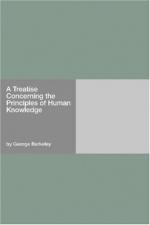15. Nor for the enlargement of knowledge.—Nor do I think them a whit more needful for the enlargement of knowledge than for communication. It is, I know, a point much insisted on, that all knowledge and demonstration are about universal notions, to which I fully agree: but then it doth not appear to me that those notions are formed by abstraction in the manner premised—universality, so far as I can comprehend, not consisting in the absolute, positive nature or conception of anything, but in the relation it bears to the particulars signified or represented by it; by virtue whereof it is that things, names, or notions, being in their own nature particular, are rendered universal. Thus, when I demonstrate any proposition concerning triangles, it is to be supposed that I have in view the universal idea of a triangle; which ought not to be understood as if I could frame an idea of a triangle which was neither equilateral, nor scalenon, nor equicrural; but only that the particular triangle I consider, whether of this or that sort it matters not, doth equally stand for and represent all rectilinear triangles whatsoever, and is in that sense universal. All which seems very plain and not to include any difficulty in it.




